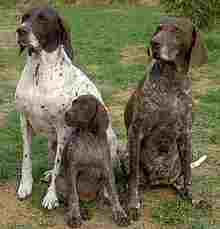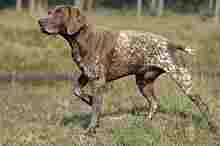HISTORY
 The precise origin of the German Shorthaired Pointer is unclear. According to the American Kennel Club, it is likely that the GSP is descended from a breed known as the German Bird Dog, which itself is related to the Old Spanish Pointer introduced to Germany in the 17th century. It is also likely that various German hound and tracking dogs, as well as the English Pointer and the Arkwright Pointer also contributed to the development of the breed. However, as the first studbook was not created until 1870, it is impossible to identify all of the dogs that went into creating this breed. The breed was officially recognized by the American Kennel Club in 1930.
The precise origin of the German Shorthaired Pointer is unclear. According to the American Kennel Club, it is likely that the GSP is descended from a breed known as the German Bird Dog, which itself is related to the Old Spanish Pointer introduced to Germany in the 17th century. It is also likely that various German hound and tracking dogs, as well as the English Pointer and the Arkwright Pointer also contributed to the development of the breed. However, as the first studbook was not created until 1870, it is impossible to identify all of the dogs that went into creating this breed. The breed was officially recognized by the American Kennel Club in 1930.
CARE
German Shorthaired Pointers along with other sporting dogs requires a lot of exercise and space to run. GSPs have a lot of energy, they are one of the most energetic breeds. Therefore if not given the right amount of attention, they can become bored and destructive. GSPs do not do well left alone all day or if relegated to a kennel without plenty of human interaction. GSPs are a very clean breed. The short GSP coat needs very little grooming, just occasional brushing. They typically shed constantly. GSPs should be bathed only when needed. Like all dogs with flop ears, GSP can be prone to ear infections and their ears require regular checking and cleaning. The GSP has a median lifespan of 9 years in a Danish survey and 12 years in a UK survey. In the UK survey about 1 in 8 lived to 15 years with the longest lived dog living to 17 years. As the GSP is a medium/large, active breed, the dogs can require considerable food. Older or less active GSPs can also become obese if fed more than suitable for the individual’s activity levels. A healthy weight should permit the last two ribs to be felt under the coat and the dog should have a distinct waist or “tuck-up”. Due to the short GSP coat, body heat management is not generally a problem. However, the GSP’s high levels of activity require the breed to drink considerable amounts of water to prevent dehydration. Early symptoms of dehydration show itself as thick saliva and urine with an excessively strong and distinct smell.
BASIC INFORMATIONS

Origin: Germany
AKC: Sporting
ANKC: Group 3 (Gundogs)
CKC: Group 1 – Sporting Dogs
KC: Gundog
NZKC: Gundog
